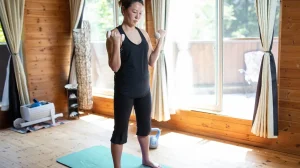The Importance of Regular Exercise for Overall Health

People of any age or ability can benefit from regular physical activity. Exercise boosts energy, builds strength and can help with weight loss.
In addition, it prevents disease, strengthens bones and muscles and improves everyday function. It’s never too late to begin exercising regularly – even activity levels below those recommended by health experts still produce benefits.
Weight Loss
Physical exercise is any bodily activity that enhances health and fitness. It helps to manage body weight, improves self-esteem and energy levels, reduces stress and depression and increases sleep quality and overall mood.
Even moderate physical activity reduces the risk of type 2 diabetes and cardiovascular disease by lowering blood pressure and improving high-density lipoprotein (HDL) cholesterol and unhealthy triglycerides. Try to make exercise a regular part of your routine. It can be as simple as going for walks or revving up your household chores.
Better Sleep
Sleep is key for overall health and can help prevent serious diseases like heart disease, diabetes, and weight gain. Regular exercise helps improve sleep quality, relieve stress, and reset your circadian rhythm.
Try to exercise early in the day so that you can allow your body time to relax before you go to bed. This allows you to establish a positive feedback loop between your sleep and your exercise. Experiment with different times of day to see what works best for you and your sleep habits.
Reduced Risk of Disease
Studies show that people who exercise regularly have a lower risk of several conditions, including heart disease, cancer and stroke. Even those who get only the minimum amounts of physical activity recommended by Health Canada benefit. Those who go above and beyond the recommended amounts may enjoy even greater longevity rewards.
Any amount of moderate physical activity reduces the risk of chronic diseases and premature death, and strengthens bones and muscles. It also helps you feel your best and can boost your energy levels.
Better Mental Health
Exercise can improve your mood, lower anxiety and stress levels, increase energy and help you sleep better. It may also reduce your risk of depression and dementia as you age.
Exercise strengthens the lungs and heart so they can take in more oxygen. It can help you feel more energized throughout the day, but avoid strenuous workouts right before bed as they can make it hard to fall asleep.
Exercise can reduce feelings of loneliness and isolation by encouraging you to get out into social settings such as community walking tracks and gyms. It can also be a great way to form new friendships and reconnect with existing ones.
Better Heart Health
Physical activity and exercise are good for your heart, muscles, bones and mental health. Even little things like walking to the mailbox or taking out the trash can be considered exercise.
Moderate-to-vigorous exercise boosts your heart muscle, improves blood circulation and increases oxygen levels in the body. It also helps lower high cholesterol, blood pressure and unhealthy triglycerides. It’s important to talk with your doctor before starting an exercise program if you have any health or fitness concerns.
Reduced Risk of Cancer
Studies show that people who exercise regularly are at a lower risk of cancer. The research is based on observational studies in which participants report their leisure time physical activity and are then followed over time for cancer diagnoses.
Hundreds of epidemiologic studies involving millions of people have shown that people with the highest levels of physical activity compared to those with the lowest levels had 10 to 20 percent lower risks for bladder, breast, colon, endometrial, esophageal, renal and gastric cancers.
Better Bone Health
Regular exercise increases bone density and strength, which decreases the risk of fractures. It also improves balance, which can decrease the risk of falling and injuries.
Experts recommend a weekly workout of moderate impact or weight-bearing exercise, such as jumping, running, tennis, dancing, and walking up and down stairs. These types of workouts work bones by making them support their own weight and jolt them rapidly.
Non-weight-bearing exercises, such as swimming and using the elliptical machine, are good alternatives for people who can’t do high-impact workouts.
Reduced Risk of Arthritis
Exercise improves function, mood and quality of life in people with arthritis and other musculoskeletal conditions. It also reduces cardiovascular comorbidity in these individuals.
Getting regular exercise improves muscle strength, helps maintain a healthy weight and can even help with joint pain by taking pressure off sore joints. Exercises that improve balance and posture can also help.
It’s important to start slow and not push yourself too hard. If a joint or muscle feels uncomfortable after exercising for two hours, decrease the intensity or try something different next time.






